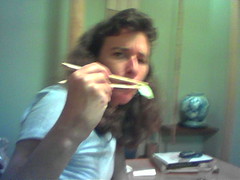Billy has been taking me to Kampachi for more than a dozen years. Kampachi is the best sushi bar I've ever been to: very traditional, very Japanese, with a master chef who appreciates customers with adventurous tastes. Billy, who has been going to Kampachi since the 1980s, often says that no matter how many times he's been there, every visit brings at least one dish he's never tried before. Which given Billy's experience with and understanding of sushi, is really saying something. At Kampachi, they call Billy "Sushi Ken" - not because they don't know his name, but because "Ken" means "master" (or something along those lines). Billy's knowledge of sushi (and just about every other major cuisine you could name) is encyclopedic. He and the master chef discuss ingredients, philosophies of Japanese food, its presentation, the aesthetics and culture. So going to Kampachi is more than a gustatory experience - it's an intellectual one as well (you can read Billy's review of Kamapchi
here).
But oh, the food...so many different, tantalizing flavors, textures, subtle combinations. As much as we enjoy talking during these long, drawn-out meals, there will come a point - several - heck, at least one for just about every dish - where we're reduced to happy sighs and embarrassingly orgasmic moans. Damn, the food is good.
The other night, while sitting at the sushi bar, someone - I forget who - commented on a handwritten sign in Japanese posted on the wall. "That says, 'fire,'" I pipe up. "And that one's...wind." One of the chefs has studied some Chinese, so towards the end of the evening, when I've had a couple sakes, we generally exchange a few words.
"It's for fugu," the chef explains.
"You can get fugu?" Billy asks, more than casually interested.
"Yes. From Japan. Just order four days in advance."
Now, I've heard of fugu. It's a blowfish of some sort, considered a delicacy (and a very expensive one) in Japan. Partially because it's very poisonous, and has to be prepared just right in order to ensure repeat business from your clientele. Who, if the fugu
isn't prepared just right, can drop dead on the spot from respiratory paralysis.
By the time I've returned from the restroom, Billy has determined that a special fugu dinner is just what's needed as a belated celebration of my birthday.
The next Wednesday, Billy, Pete (an old research buddy and my original link to Billy - the two of them are childhood friends) and my sister, Dana, meet at Kampachi for our arranged fugu dinner.
I'd very much been looking forward to the dinner. But for some reason I'd been reluctant to make too many jokes about death by fugu in the preceding email exchanges. Because, of course, that wasn't going to happen. Was it? I mean, this is one of the best sushi chefs in greater Los Angeles. Surely there was nothing to worry about. Probably the whole danger aspect was exaggerated anyway.
Still, I avoided telling anyone exactly what the dinner was about. Just, because, well, you know...
The day of the dinner, I did a little research. The preparation of fugu is tightly regulated, I was happy to discover. Chefs are rigorously trained. Hardly anyone is poisoned by fugu these days, even if the amount of toxin in the liver is enough to kill thirty grown men; the poisonings that do occur tend to happen in outlying areas of Japan, with chefs who aren't properly certified. So what if the Lonely Planet
website quoted a line from a Japanese poem: "Last night he and I ate fugu; today I helped carry his coffin." That was from, like, ages ago. And that crack about fugu being the dining equivalent of bungee-jumping...kind of a cheap shot, really.
In truth, I am not a bungee-jumping person. I tend to be cautious and analytical. And a great spinner of worst-case scenarios. God, how embarrasing would it be if I died from fugu poisoning?
We sat in the tatami room, Billy, Pete, Dana and I, drinking hot sake and waiting for our fugu. By now we were cracking jokes. Fugu dinners are highly ritualized (for a more positive account than Lonely Planet's, go
here, and for additional interesting information,
here). Fugu sashimi comes on a huge platter, sliced thin to the point of translucence. Special scallions from Japan, tiny green reeds, are rolled up in the fugu, which is dipped in ponzu sauce. You can add a kind of daikon relish and more scallions if you'd like.
But when the fugu platter came, we all kind of stared at it for a while.
"I'm not going first," I announced.
Billy, true to form, took the first bite.
And when he didn't die, we all plunged in, quickly putting aside any thoughts of danger or mortality. It seemed the most normal, delightful thing in the world, to be sitting in that tatami room, drinking sake and eating fugu with good friends.
Fugu has a delicate flavor and a slightly rubbery texture. The first bite, I thought I felt that tingling of the lips and tongue that marks the residual toxin and is so prized by afficionados, but I can't be certain. "Do you think it's so prized because it can kill you?" I ask Billy, thinking of a Japanese proverb I'd read earlier in the day: "Those who eat fugu soup are stupid. But those who don't eat fugu soup are also stupid."
"It's because of the delicacy of the flavor," Billy replies. "Keep in mind that the ultimate expression of Japanese cuisine is a plain custard."
I think it's a little of both, an expression of the contrasts, the light and the dark, the attempt at balance, that are so much a part of Japanese culture. I think of another poem I'd read:
I cannot see her tonight.
I have to give her up
So I will eat fugu.
After the sashimi, the server - I hesitate to call her a waitress, she is something above that - brings us something that she isn't sure we'll like. Hot sake in big covered cups, in which soaks a fugu fin. It's absolutely delicious - a sort of cross between sake and a meaty broth. Next, we made soup: a huge clay pot of water on a gas burner, in which we spooned chunks of fugu, onions, tofu, greens and mushrooms. Simple, plain, unspiced and unornamented. It's ironic, the juxtaposition of this prized, gourmet ingredient and almost peasant fare.
All the while we talked, we toasted, we laughed. We celebrated our lives and our friendships. And I think perhaps this is part of the meaning of a fugu dinner. We're all of us living on the edge of dying. We can mourn, and sometimes we must. And we can celebrate. Also because we must.
And for dessert, we had toro.











